Today (16th October) is Restart a Heart Day 2024, which aims to raise awareness about sudden cardiac arrest and encourage people to learn life-saving CPR.
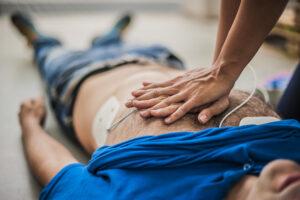 Taking place on and around 16th October every year, Restart a Heart Day is led by an alliance of national and international partners, such as the British Heart Foundation, the Resuscitation Council UK, NHS England and the Association of Ambulance Chief Executives.
Taking place on and around 16th October every year, Restart a Heart Day is led by an alliance of national and international partners, such as the British Heart Foundation, the Resuscitation Council UK, NHS England and the Association of Ambulance Chief Executives.
They want to get as many people as possible to learn CPR and defibrillation skills.
Restart a Heart Day: helping more people survive cardiac arrest
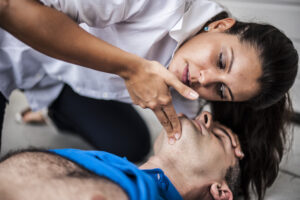 The British Heart Foundation (BHF) says that more than 30,000 people experience an out-of-hospital cardiac arrest every year in the UK, but, sadly, survival rates remain low, with fewer than 1 in 10 people surviving.
The British Heart Foundation (BHF) says that more than 30,000 people experience an out-of-hospital cardiac arrest every year in the UK, but, sadly, survival rates remain low, with fewer than 1 in 10 people surviving.
Early emergency response in the form of CPR and automatic external defibrillation can more than double a person’s chances of survival, but surveys show that only 4 in 10 people in the UK would be confident enough to perform CPR on someone who has experienced a cardiac arrest.
This is why organisations such as the BHF and the Resuscitation Council UK support Restart a Heart Day – they want as many people as possible to gain the skills and confidence to carry out CPR and defibrillation in an emergency.
The annual initiative spreads the message that it’s essential that everyone knows the key steps for survival if someone collapses and stops breathing. These are:
- Call 999 – early emergency care is vital to ensuring people survive
- Perform CPR – early cardiopulmonary resuscitation (CPR) – a technique combining chest compressions and rescue breaths to keep a person’s blood pumping around their body – is essential
- Use a defibrillator – if there is one available nearby, using an automated external defibrillator (AED, also known as a defibrillator or defib) as soon as possible can significantly increase a person’s chances of surviving a cardiac arrest
For every minute that passes without CPR and defibrillation being performed, a person’s chances of surviving a cardiac arrest reduce by up to 10%.
Improving access to CPR and defibrillators
Sadly, access to life-saving defibrillators is not equal. Research supported by the BHF shows that, in the most deprived areas, the nearest defibrillator which is publicly accessible 24/7 is, on average, a round trip of over a mile or 1.8km away.
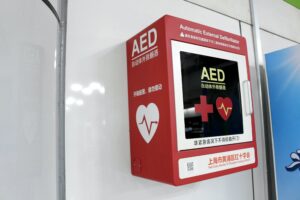 They are reopening their Community Defibrillator Funding Programme for 2024, coinciding with Restart a Heart Day. This enables eligible community groups to apply for a free defibrillator. They can also learn how to build a ‘Heartsafe’ community with the BHF’s free downloadable resource.
They are reopening their Community Defibrillator Funding Programme for 2024, coinciding with Restart a Heart Day. This enables eligible community groups to apply for a free defibrillator. They can also learn how to build a ‘Heartsafe’ community with the BHF’s free downloadable resource.
In recent years, there have been multiple campaigns to try to increase the number of publicly available defibrillators to improve everyone’s access to this life-saving equipment. It’s important to register all defibrillators on The Circuit – the UK’s national defibrillator network which helps people locate a defibrillator near to them.
Figures also show that, in the UK, 80% of out-of-hospital cardiac arrests occur within the home. This means that the best method of protecting your loved ones is by learning CPR.
For Restart a Heart Day, the BHF is urging people to use their free online training tool, RevivR to help them learn how to perform CPR in just 15 minutes.
Schools can also access free training through Classroom RevivR.
Restart a Heart Day: Are you ResusReady?
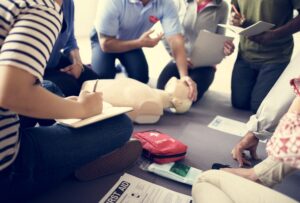 The Resuscitation Council UK are reinforcing the simple message of ‘learn CPR, act fast, save lives’ this Restart a Heart Day.
The Resuscitation Council UK are reinforcing the simple message of ‘learn CPR, act fast, save lives’ this Restart a Heart Day.
They offer a range of free resources, videos, information and digital communication packs on their website. They also provide a lowdown on Restart a Heart Day events and encourage everyone to get involved in the conversation by using the hashtag #RestartaHeart on social media.
The Resuscitation Council UK always organises and facilitates a series of events for Restart a Heart Day, while continuing to shine a spotlight on the inequalities in resuscitation in the UK.
They explain that “bystander CPR is performed less often in deprived communities” and they have launched their ‘ResusReady’ interactive map to capture vital data about where they need to target their efforts to ensure everyone in the UK has an equal chance of survival.
They want to encourage more individuals and organisations to undergo CPR training and ensure they are “defib aware” within their communities, to help progress towards every community in the UK being ‘ResusReady’ and able to improve survival rates.
Close the gender survival gap this Restart a Heart Day
Meanwhile, St. John’s Ambulance have launched the CPR Bra campaign in conjunction with Restart a Heart Day 2024.
The national charity cites research that suggests that women are less likely to receive life-saving CPR in public than men.
 Their research found that 1 in 3 people are afraid to give CPR to women in public because they are worried about touching their breasts in order to perform vital chest compressions.
Their research found that 1 in 3 people are afraid to give CPR to women in public because they are worried about touching their breasts in order to perform vital chest compressions.
They have created the CPR Bra to educate people and “close the gender survival gap” by reassuring people that taking swift action to perform CPR is the right thing to do to help save a life, regardless of gender.
The CPR Bra features the message: “It’s OK to Save My Life” on the front, along with a reminder of the essential steps to take when responding to a cardiac arrest.
Supported by some well-known faces, St. John’s Ambulance say they want to “bust this taboo and save more lives,” this Restart a Heart Day.
They provide free first aid advice, public demonstrations and training courses to help support Restart a Heart Day and are emphasising the message that it’s okay to touch part of someone’s breasts to give them CPR when they have experienced a cardiac arrest. It’s even ok to cut their bra or binding off to use a defibrillator to give them the best chance of surviving.
Their website includes a simple how-to which outlines how to perform CPR on a person with breasts.
Vital first aid training and guidance
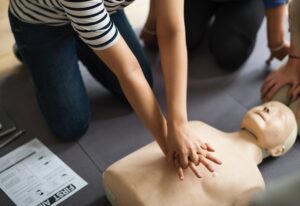 First Response Training is a leading national training provider.
First Response Training is a leading national training provider.
They deliver a wide range of training in health, safety, first aid, fire safety, food safety, health and social care, mental health and welfare and other special focus topics for all industry sectors.
They have over 27 years’ experience in delivering first class first aid training services, including First Aid at Work, Emergency First Aid at Work, Paediatric First Aid and Basic Life Support courses, all of which include CPR training and information and training on the use of defibrillators.
A trainer from FRT says:
“Every second counts when someone has experienced a cardiac arrest. That’s why it’s so vital that as many people as possible are competent and confident to provide early and effective CPR and defibrillation. It really can be the difference between life and death.
“There’s lots of ways in which you can learn CPR, including lots of free avenues. Undergoing a more in-depth first aid training course will really help to cement your knowledge, skills and confidence, however, and also teach you other important first aid skills, such as the recovery position, how to respond to choking and the initial treatment for things such as burns, scalds, fractures and bleeding.
“Meanwhile, defibrillators should be made easily accessible to all, as they really can save lives. Although you do not need training to use a defibrillator successfully, it’s good to be familiar with one and how they work, and our courses cover this and include AED training models.
“However, you never know if one of these life-saving machines will be available. It’s therefore vitally important for as many people as possible to learn essential life-saving CPR skills and other first aid techniques so that they can act quickly and help people in an emergency.
“First aid training really is so valuable and we have always believed this wholeheartedly, previously offering free community first aid training and lessons for school pupils.”
For a simple guide to responding to an emergency and providing essential, life-saving CPR, you can now download our free guide ‘How to Respond to an Emergency.’
You can check the location of your nearest defibrillator online.
If you are a defibrillator guardian, make sure you register it online with The Circuit – the National Defibrillator Network.
For more information on the training that FRT can provide, please call them today on freephone 0800 310 2300 or send an e-mail to info@firstresponsetraining.com.
